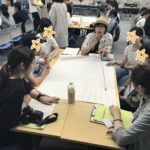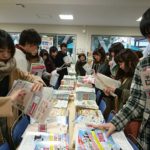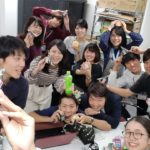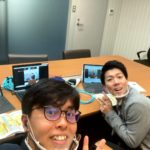Ryosuke Shikata, 23, Kyoto University Co-op, Japan
When I was a student at Nara Prefectural University, I joined the Nara Prefectural University Co-op as a member. Soon after that, I was invited by a friend to join its Student Committee and served on the Board of Directors as the Student Director. That is the beginning of my deep involvement in the co-op movement. I became more interested in co-ops and the roles and values they can play. During my senior year, I was in a position to tell junior students about the history and activities of co-ops and consumer co-ops. I also listened to stories from senior students and read various books to prepare seminars and materials for various co-op activities.
I served as a member of the Student Committee at National Federation of University Co-operative Associations (NFUCA). In 2020, I was in charge of aggregating the survey data and publishing the Fact-Finding Survey on Student Life.
Currently, I am working at Kyoto University Co-op and I work at Yoshida Store, a convenience store of Kyoto University Co-op. I realize that students are still facing many uncertainties, and we are constantly searching for ways to help them through our business activities.
I started to learn about co-ops through the activities at the Nara Prefectural University Co-op. I never dreamed that I would be working as a full-time employee in a co-op. I still can’t believe it. I have become more tolerant, and learned that everyone has a different personality and different ways of living.
I gained powerful knowledge through learning the ideology and and practice of co-ops, especially consumer co-ops, and through my colleagues at the university co-op. Because I have practiced through trial and error how people with different life experiences can connect, talk, and help each other, I have come to focus on the person rather than the event that is happening.
I am convinced that the co-op movement has and will continue to influence and contribute not only to the members, but also to the civil society and local communities where the co-op exists. Co-ops are organizations of members, and they have pursued the common interests of their members through cooperation. The cooperative identity pursues the public interest in order to create a cooperative society where people who have been oppressed in a competitive society can lead a decent life.
Education also lies in the center of any major movement and project. In co-ops, members’ enjoyment of their rights and their own responsibility to support stable co-op governance are two sides of the same coin. Without participation in the business activities, it is impossible to benefit from a co-op. And I believe this is also true in civil society. In this sense, I believe that the co-op model has the power to improve society by nurturing citizens who have the will to lead a fulfilling life.
Co-ops also strive to improve the lives of individual members by revitalizing a community through its business activities and collective quality of life. I believe that this is an important way of thinking to improve the lives of everyone.
What does the co-operative identity mean to me?
To put it simply, the co-operative identity is a means for the betterment of society. In learning about the co-operative identity, I was given a language to express my idealistic thoughts. Ever since I was a child, I have had a vague idea that we want and need to improve society by our own power, without creating a huge gap between us and the rest of the world, and without asking God’s help. This vague idea turned into a concrete one as I learned about co-ops. I felt that the co-op model was not an unrealistic dream, but a model that had the potential to steadily improve society with its feet on the ground. Co-ops have been flourishing in a capitalist society, perhaps because they have been running business activities while using the profit as a means to improve their community. Co-ops are business entities and movements that are governed voluntarily by us, the members, by respecting the rights of others (you) from my perspective, and by valuing the responsibility to play a role in supporting them. I believe that this can be a common language for the world, and that the socialization of this democratic co-operative ideology will improve society as a whole.
I hope that by becoming a member of the university co-op, using the services it offers, and participating in its activities, people will learn about co-operative ideology. University students are the leaders of the future society and citizens who have legitimate power in the country. I believe that a better society will naturally be created if students become members of society (citizens) with a cooperative ideology or become respectable cooperators. For that reason, too, I would like to play my role to make university co-op into a community that educates citizens, and as a co-operator, I would like to educate citizens by promoting co-ops.
















